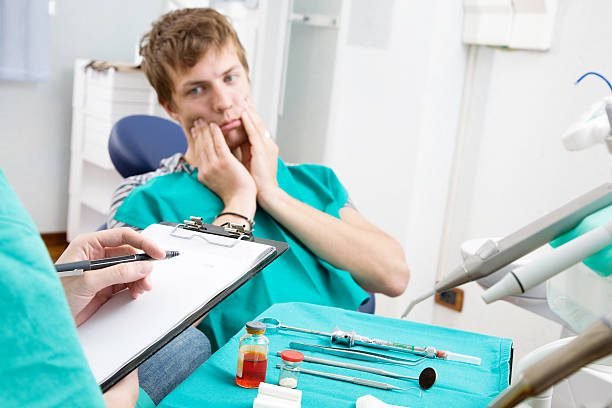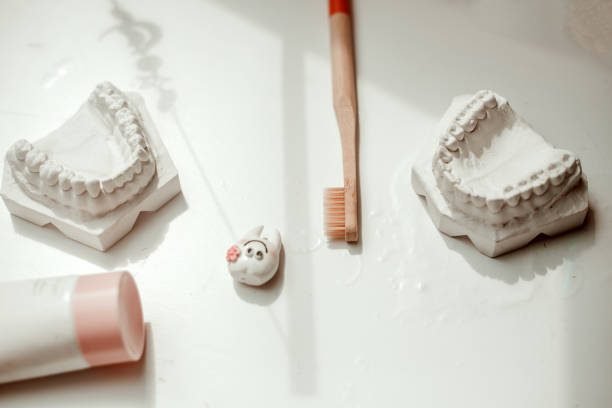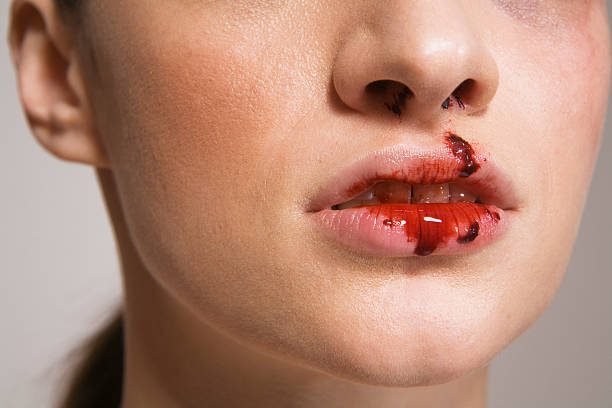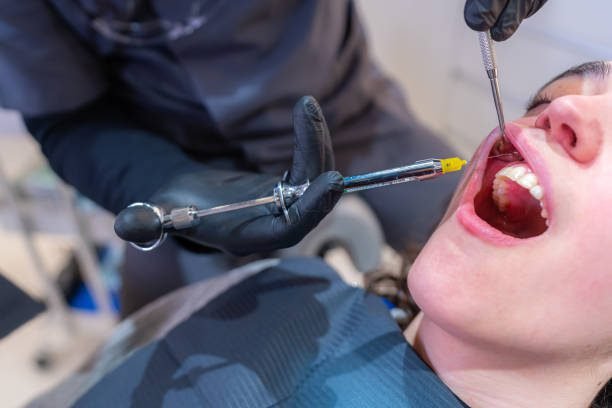Physical Address
304 North Cardinal St.
Dorchester Center, MA 02124
Physical Address
304 North Cardinal St.
Dorchester Center, MA 02124

Learn how to handle common dental emergencies effectively.

Handling broken dentures can be a stressful situation, but knowing the right tips can help you navigate the process more smoothly. Firstly, it is important to handle the broken dentures with care to avoid any further damage. To do this, gently pick up the broken pieces and place them in a container filled with water or a denture cleaning solution. It is crucial not to use any adhesive or try to fix the dentures yourself, as this can lead to further complications.
Once you have safely stored the broken dentures, the next step is to seek timely repairs. Contact your dentist immediately to schedule an appointment for denture repair. Dentists have the necessary expertise and tools to fix broken dentures effectively. It is important to address the issue promptly, as delays in repairs can cause discomfort and make the repair process more challenging. Your dentist will evaluate the damage and recommend the appropriate course of action, whether it is a simple repair or a replacement of the dentures.

Injuries to the tongue or lip caused by accidental biting or trauma can be quite painful and may require immediate first aid measures. It is essential to take prompt action to minimize pain and reduce the risk of infection.
The first step in managing tongue or lip injuries is to clean the affected area with a gentle antiseptic solution or warm water. This will help remove any debris or bacteria and prevent further contamination. Applying a cold compress or ice pack to the injured area can help reduce swelling and alleviate pain. It is important to avoid hot or spicy foods, as they can irritate the injury and prolong the healing process.
In some cases, a tongue or lip injury may cause excessive bleeding. To control bleeding, apply gentle pressure to the wound with a clean cloth or gauze pad. If the bleeding persists or is severe, it is crucial to seek immediate medical attention. Additionally, over-the-counter pain relievers like ibuprofen can provide temporary relief from pain and discomfort.
Remember, tongue and lip injuries can vary in severity. If you experience severe pain, excessive bleeding, or signs of infection such as fever or swelling, it is crucial to consult a dental healthcare professional for a comprehensive evaluation and appropriate treatment.

Soft tissue lacerations in the mouth can be quite painful and may occur due to accidental biting, trauma, or other injuries. It is important to take immediate steps to control bleeding and promote healing for cuts or tears in the mouth.
The first step in controlling bleeding is to apply gentle pressure to the affected area using a clean cloth or sterile gauze. Make sure to do this with clean hands to prevent any infection. If the bleeding does not subside after a few minutes, it is advisable to seek professional medical help. Moreover, to promote healing, it is important to keep the affected area clean. Gently rinse your mouth with warm saltwater solution, as it helps to reduce bacteria and soothe the injured tissue. Additionally, maintaining good oral hygiene by brushing gently and avoiding hard or crunchy foods can aid in the healing process.
Soft tissue lacerations may take time to heal completely, depending on their severity. It is essential to closely monitor the healing progress and follow any instructions provided by a dental professional. In case of any concerns such as excessive bleeding, persistent pain, or signs of infection like swelling or discharge, it is crucial to reach out to a dentist for further evaluation and appropriate treatment. Taking proper care of soft tissue lacerations can help in reducing complications and ensuring a quicker recovery.
Impacted wisdom teeth can cause a range of symptoms and potential complications. The most common symptoms include pain, swelling, and difficulty in opening the mouth fully. Some individuals may also experience bad breath, an unpleasant taste in the mouth, or difficulty in chewing food properly. If left untreated, impacted wisdom teeth can lead to more serious complications such as infection, decay, and damage to adjacent teeth.
One of the most concerning complications associated with impacted wisdom teeth is the risk of cysts or tumors developing around the impacted tooth. These can lead to bone loss and damage to surrounding structures if not addressed promptly. In some cases, impacted wisdom teeth can also lead to overcrowding of the existing teeth, causing misalignment and bite problems. Therefore, it is essential to recognize the symptoms of impacted wisdom teeth and seek timely dental intervention to prevent further complications and promote oral health.
Here’s a table summarizing symptoms and potential complications associated with impacted wisdom teeth:
| Symptom/Complication | Description | Credible Source |
|---|---|---|
| Pain and Discomfort | Impacted wisdom teeth may cause pain or discomfort, especially when chewing, biting, or opening the mouth wide. The pain may radiate to the jaw, ear, or surrounding teeth. | Mayo Clinic: Link |
| Swelling and Tenderness | Swelling and tenderness in the gum tissue around the impacted tooth are common symptoms. The area may feel tender to the touch, and there may be visible swelling or inflammation. | American Association of Oral and Maxillofacial Surgeons: Link |
| Difficulty Opening the Mouth | Impacted wisdom teeth can restrict the movement of the jaw, leading to difficulty opening the mouth fully or experiencing jaw stiffness. | American Dental Association (ADA): Link |
| Redness and Irritation | The gum tissue around impacted wisdom teeth may appear red, inflamed, or irritated. Persistent redness or irritation may indicate infection or other complications. | WebMD: Link |
| Bad Breath (Halitosis) | Impacted wisdom teeth can create pockets where food particles and bacteria accumulate, leading to bad breath. This condition, known as halitosis, may persist despite regular oral hygiene practices. | National Institutes of Health (NIH): Link |
| Gum Infection (Pericoronitis) | Pericoronitis is an infection of the gum tissue surrounding a partially erupted or impacted tooth. Symptoms include pain, swelling, redness, and pus discharge. Left untreated, pericoronitis can lead to more severe infections or complications. | Centers for Disease Control and Prevention (CDC): Link |
| Tooth Decay and Cavities | Impacted wisdom teeth are more difficult to clean, increasing the risk of Tooth Decay and Cavities in the affected area and neighboring teeth. | American Academy of Periodontology (AAP): Link |
| Damage to Adjacent Teeth | Impacted wisdom teeth may exert pressure on adjacent teeth, causing crowding, misalignment, or damage to nearby teeth. | American Academy of Orthodontics (AAO): Link |
| Cysts and Tumors | In rare cases, impacted wisdom teeth may lead to the formation of cysts or tumors in the jawbone. These growths can cause pain, swelling, and damage to surrounding tissues and structures, requiring surgical intervention for removal. | National Institute of Dental and Craniofacial Research (NIDCR): Link |
Soft tissue lacerations in the mouth are common occurrences, often resulting from accidents or trauma. When faced with such an injury, it is crucial to take immediate steps to control bleeding and promote healing. Firstly, clean the affected area gently with mild saline solution or warm water to remove any debris or bacteria. Applying gentle pressure with a clean gauze pad or cotton ball can help stop the bleeding.
If the bleeding persists or the laceration is severe, it is vital to seek professional dental care promptly. Dentists possess the expertise and tools necessary to properly clean and suture the wound, reducing the risk of infection and ensuring optimal healing. Additionally, your dentist may provide guidance on pain management and recommend appropriate medications or oral rinses to aid in the recovery process. Remember, prompt treatment and diligent care are essential for a successful healing outcome in cases of soft tissue lacerations in the mouth.
To prevent denture breakage, handle them with care, avoid biting on hard objects, store them properly when not in use, and schedule regular check-ups with your dentist for adjustments if needed.
If your dentures break, it is important to avoid using DIY repair kits and seek professional help instead. Contact your dentist immediately to schedule a denture repair appointment.
While there are DIY denture repair kits available, it is highly recommended to avoid attempting to fix broken dentures at home. DIY repairs can lead to further damage and may affect the fit and functionality of the dentures.
The time required to repair broken dentures can vary depending on the severity of the damage. Simple repairs may take a few hours, while more complex cases might require a couple of days. Your dentist will be able to provide you with a specific timeframe.
If you accidentally bite your tongue or lip, rinse your mouth with warm saltwater, apply a clean cloth or gauze to control bleeding, and use ice packs to reduce swelling. If the bleeding persists or the injury is severe, seek medical attention promptly.
The healing time for tongue or lip injuries may vary depending on the severity of the injury. Minor injuries usually heal within a week or two, while deeper cuts or tears may take longer. If you have concerns about the healing process, consult your healthcare professional.
If you have a soft tissue laceration in your mouth, rinse your mouth with mild saltwater, apply gentle pressure with a clean cloth or gauze to control bleeding, and seek immediate medical attention if the bleeding does not stop or the wound is deep.
To promote healing for a soft tissue laceration, maintain good oral hygiene, avoid irritating or spicy foods, refrain from smoking or using tobacco products, and follow any specific instructions given by your healthcare professional.
Symptoms of impacted wisdom teeth may include pain, swelling, redness, difficulty opening the mouth, bad breath, unpleasant taste, and difficulty chewing or biting. It is important to consult with a dentist if you experience any of these symptoms.
Impacted wisdom teeth can lead to various complications such as tooth decay, gum disease, infection, crowding or shifting of other teeth, cyst formation, and jaw damage. Regular dental check-ups can help identify and address impacted wisdom teeth before these complications occur.